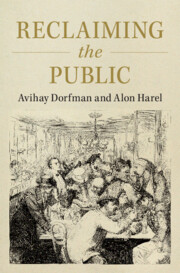Book contents
- Reclaiming the Public
- Reclaiming the Public
- Copyright page
- Dedication
- Contents
- Acknowledgments
- Introduction
- 1 A Public Conception of Political Authority
- 2 Law as Standing
- 3 Speaking in a Different Voice
- 4 Inherently Public Goods
- 5 Against Privatization as Such
- 6 Public Ownership
- 7 Why Not Artificial Intelligence?
- Concluding Remarks
- Index
3 - Speaking in a Different Voice
The Necessity of Institutional Pluralism
Published online by Cambridge University Press: 22 February 2024
- Reclaiming the Public
- Reclaiming the Public
- Copyright page
- Dedication
- Contents
- Acknowledgments
- Introduction
- 1 A Public Conception of Political Authority
- 2 Law as Standing
- 3 Speaking in a Different Voice
- 4 Inherently Public Goods
- 5 Against Privatization as Such
- 6 Public Ownership
- 7 Why Not Artificial Intelligence?
- Concluding Remarks
- Index
Summary
This chapter explores the question of what it means for a lawmaking institution to speak and act in our name. We maintain that different institutions can do so in different ways; even identical laws may have different meanings and significance depending on their institutional source.
We challenge the commonly held assumption that the institutional source of a legal norm – be it the constitution, legislation, and so on – does not affect its nature. We argue that institutions are not merely vessels through which norms get public recognition. When different institutions use identically worded norms, say, “everyone is equally entitled to X,” they may nevertheless produce different norms and provide different goods. For instance, a constitutional protection of a basic right differs from a statutory right to the same right, not because the former is less likely to be changed but because a constitutional decision marks the right in question as one that makes no essential reference to the actual choice of the majority of the political community. We extend this argument to other institutional settings, especially the common law tradition of judge-made law. We further discuss the doctrinal implications of the argument, defending a new kind of remedy: institutional remedies.
Keywords
- Type
- Chapter
- Information
- Reclaiming the Public , pp. 64 - 93Publisher: Cambridge University PressPrint publication year: 2024



